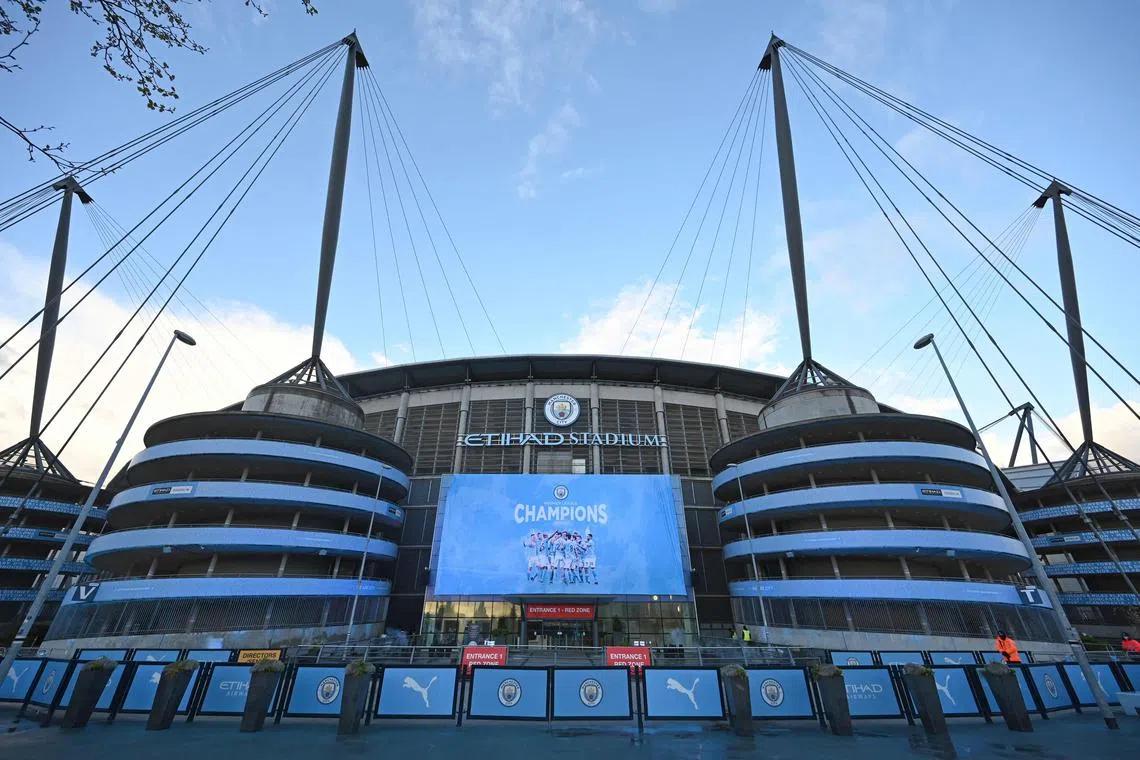Football: The Premier League’s charges against Manchester City, explained
Sign up now: Get ST's newsletters delivered to your inbox

Manchester City has been referred to an independent commission over alleged breaches of its financial rules.
PHOTO: AFP
Follow topic:
NEW YORK – The Premier League has accused Manchester City of more than 100 violations of its financial regulations,
City says it has done nothing wrong and declared itself “surprised” at the airing of what it referred to as “alleged breaches”. The Premier League’s statement suggests its thick rule book views the case quite differently.
What are the accusations? What violations do they refer to specifically? If they are true, what potential punishment does City face?
What is the case about?
Broadly, the Premier League has accused City of repeatedly failing to provide accurate financial information “that gives a true and fair view of the club’s financial position, in particular with respect to its revenue (including sponsorship revenue), its related parties and its operating costs”.
City also stands accused of not disclosing contractual payments to managers and players – presumably to hide the true costs of building one of the world’s best teams – and of failing, as required, to abide by the financial control mechanisms set by the league but also Uefa, European football’s governing body. It is also accused of not cooperating with Premier League investigators.
What has been delivered?
City had won two English top-division titles in its history – in 1937 and 1968 – before its Abu Dhabi-based owners arrived in 2008. In more than a decade since, the club has claimed six Premier League titles, two FA Cups and six League Cups.
What punishment will it face?
If the club is found to have breached the financial rules, the Premier League lays out sanctions that could include penalties like reprimands and fines and – far more worrisome if you are City – points deduction in the standings or even expulsion from the top division and stripping of titles.
Expelling City from the Premier League would be a very big deal. Rewriting the league’s record books, and its title history, would be just as big.
What are the charges?
The Premier League lays out its accusations against City in five points littered with legalese and references to rules like B.13, C.71, C.72 and C.75 (amended to C.79).
Let’s simplify them.
The league contends that, for every season from 2009-10 to 2017-18, City failed to abide by rules requiring member clubs to provide accurate financial information, giving it “a true and fair view” of the club’s revenues (think sponsorship) and operating costs (think salaries).
What does that mean?
All Premier League clubs sign up to a code of compliance, promising to behave as good-faith actors and provide up-to-date and true versions of their accounts to be audited every year. City has long faced accusations that it has inflated the value of its sponsorship deals with entities linked to its Gulf owners, including with the United Arab Emirates’ (UAE) national airline, Etihad, and the telecommunications company Etisalat.
Another set of charges suggests that, in the Premier League’s view, City was not truthful in its reporting of contracts detailing the compensation of its manager and certain players in several seasons.
What you might not know
City is accused of reducing the cost of player and coach salaries by paying portions of them through third parties or secret agreements, an allegation that first emerged when the German magazine Der Spiegel reported that City’s former manager Roberto Mancini actually had signed two contracts when he joined in 2009.
The first paid him £1.45 million (S$2.32 million) to manage City. The secondary agreement paid him slightly more to consult with a UAE-based team, Al Jazira, for only four days a year. City’s chairman, Sheikh Mansour bin Zayed al Nahyan, is also chairman of the company that owns Al Jazira.
The Premier League’s financial rules require that all member clubs comply not only with those regulations but also with the so-called financial fair play regulations of Uefa. For the seasons from 2013 to 2018, the Premier League contends, City was in violation of those requirements.
We’ve been here before
In 2020, Uefa hit City with a two-season ban from European competition, a suspension that would have kept City from playing in the lucrative Champions League. City had the judgment overturned on a technicality. It argued at the Court of Arbitration for Sport that the most serious allegations – linked to its sponsorship agreements with Etihad and Etisalat – were outside Uefa’s statute of limitations.
What’s next?
The Premier League says, in following its rules, it has referred the accusations against City to an independent commission. That body will take the case to a confidential hearing – read: private, no media (but expect leaks) – and then the Premier League will publish the commission’s final decision on its website.
City and the Premier League can appeal the judgment, which would be heard by a similar panel convened by Murray Rosen, a lawyer who heads the Premier League’s judicial panel. NYTIMES

